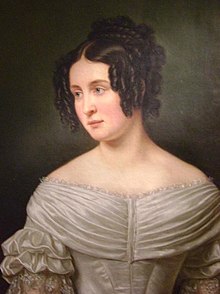User:Arw0399/Therese von Sachsen-Hildburghausen

Therese Charlotte Luise of Saxony-Hildburghausen (Therese of Bavaria; 8 July 1792 – 26 October 1854) was the princess of Sachsen-Hildburghausen and as the wife of Ludwig I, became the queen of Bavaria.
Therese was raised evangelical. She was one of the women selected to marry Napoleon, but married then crown prince Ludwig in 1810. Despite reprisals against the evangelical church during Ultramontanism in her new homeland, she remained loyal to her faith.
You are still able to celebrate their marriage with Octoberfest on the Theresienwiese. Therese was a key political advisor to her husband and her son Otto. She is idolized for being a docile wife and a good mother. Therese also focused on the wellbeing of her people, making her extremely popular during her reign.
Origin and family
[edit]Therese comes from the House of the Dukes of Sachsen-Hildburghausen, an Ernestine branch line of the Wettin. This family settled in Hildburghausen in 1680 and ran down the country financially over the next four generations so that in 1769 an imperial debit commission had to be formed to investigate the claims of the creditors and to regulate revenues and expenditures. When Therese was 14, she stoped working but the family's financial conditions were still not in order.[1]
Therese was the sixth child of Frederick, Duke of Saxe-Altenburg (1763-1834) and his wife Duchess Charlotte Georgine of Mecklenburg-Strelitz (1769-1818), daughter of Charles II, Grand Duke of Mecklenburg-Strelitz. Her mother made her niece of Louise of Mecklenburg-Strelitz and Frederica of Mecklenburg-Strelitz. The later kings of Prussia Frederick William IV of Prussia, William I, and George V of Hanover and Czarina Alexandra Feodorovna were cousins alongside the princess.
Life
[edit]Childhood
[edit]


[[Category:1854 deaths]] [[Category:1792 births]] [[Category:Dames of the Order of Theresa]] [[Category:House of Saxe-Hildburghausen]] [[Category:Bavarian queens consort]]
- ^ Rudolf Armin Human: Chronik der Stadt Hildburghausen Hildburghausen 1886, S. 193.
